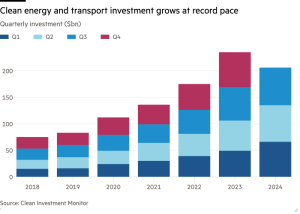A break up won’t improve CVS’s health
Unlock the Editor’s Digest for free
Roula Khalaf, Editor of the FT, selects her favourite stories in this weekly newsletter.
It wasn’t long ago that CVS Health looked poised to become a US healthcare heavyweight. The country’s largest drugstore operator owned Caremark, the pharmacy benefits manager and a reliable profit centre.
In 2017, it pushed into insurance, buying Aetna for $78bn, including debt. It then spent nearly $20bn on care providers Signify Health and Oak Street Health.
The idea was that CVS stores would become a one-stop shop, and benefit from synergies by bringing so many parts of the healthcare chain under one roof.
It hasn’t worked out that way. CVS cut its full-year earnings outlook in August for the third time this year. Its market value of $80bn is less than what it has spent on acquisitions.
Net debt has ballooned to $50bn — three times this year’s expected ebitda. It has attracted the attention of hedge fund Glenview Capital Management.
CVS’s board is reportedly reviewing its options. But a break-up would likely generate plenty of banker fees but little else.

Take the healthcare benefits business. A push to enrol more seniors to its Aetna Medicare Advantage plans backfired.
New customers brought a surge in medical claims — just as the government started to clamp down on reimbursement rates.
The medical benefit ratio — what proportion of premiums collected is paid out to providers — was 89.6 per cent in the second quarter, versus 86.2 per cent a year before.
In normal times, a standalone insurance business could command a higher valuation. Market leader UnitedHealth trades on close to 20 times forward earnings compared to CVS on 9 times.
But Aetna’s troubles have hit CVS’s shares. Given uncertainty over Medicare payment rates, a premium valuation seems unlikely.

It is a similar story in health services. This unit, which includes Caremark, is CVS’s biggest, accounting for about half of group revenue and operating income.
But US regulators are suing it — and two other PBMs — for allegedly inflating insulin drug prices. CVS has said the accusations were “simply wrong”. But regulatory overhang could dampen enthusiasm for a PBM-focused stock.
Then there is the legacy drugstore business. This sector is in secular decline. Amazon and rival retailers like Walmart have chipped away at sales of front-of-store offerings, like candy and toothpaste. Falling reimbursement rates and cheaper generics are squeezing prescription drug margins.
Still, CVS’s retail business has held up better than Rite Aid, now bust, and Walgreens Boots Alliance, aggressively shrinking. That is partly thanks to Caremark, which has helped to funnel patients to its pharmacies. A split would end that relationship. Not all ailments require radical surgery.
#break #wont #improve #CVSs #health







